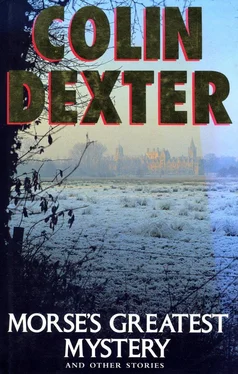“We-ell, let’s give him a chance, shall we?”
“That’s jolly kind of you. What exactly’s the procedure now?”
“Oh, don’t worry about that. I’ll be sending you all the forms and stuff. What’s his name, you say? Evans?”
“James Roderick Evans.” It sounded rather grand.
“Just one thing, Governor. He’s not a violent: sort of fellow, is he? I don’t want to know his criminal record or anything like that, but—”
“No. There’s no record of violence. Quite a pleasant sort of chap, they tell me. Bit of a card, really. One of the stars at the Christmas concert. Imitations, you know the sort of thing: Mike Yarwood stuff. No, he’s just a congenital kleptomaniac, that’s all.” The Governor was tempted to add something else, but he thought better of it. He’d look after that particular side of things himself.
“Presumably,” said the Secretary, “you can arrange a room where—”
“No problem. He’s in a cell on his own. If you’ve no objections, he can sit the exam in there.”
“That’s fine.”
“And we could easily get one of the parsons from St. Mary Mags to invigilate, if that’s—”
“Fine, yes. They seem to have a helluva lot of parsons there, don’t they?” The two men chuckled good-naturedly, and the Secretary had a final thought. “At least there’s one thing. You shouldn’t have much trouble keeping him incommunicado , should you?”
The Governor chuckled politely once more, reiterated his thanks, and slowly cradled the phone.
Evans!
“Evans the Break” as the prison officers called him. Three times he’d escaped from prison, and but for the recent wave of unrest in the maximum-security establishments up north, he wouldn’t now be gracing the Governor’s premises in Oxford; and the Governor was going to make absolutely certain that he wouldn’t be dis gracing them. Not that Evans was a real burden: just a persistent, nagging presence. He’d be all right in Oxford, though: the Governor would see to that — would see to it person ally. And besides, there was just a possibility that Evans was genuinely interested in O-level German. Just a slight possibility. Just a very slight possibility.
At 8:30 P.M. on Monday 7 June, Evans’s German teacher shook him by the hand in the heavily guarded Recreational Block, just across from D Wing.
“Guten Glück , Herr Evans.”
“Pardon?”
“I said, ‘Good luck.’ Good luck for tomorrow.”
“Oh. Thanks, er, I mean, er, Danke schön.”
“You haven’t a cat in hell’s chance of getting through, of course, but—”
“I may surprise everybody,” said Evans.
At 8:30 the following morning, Evans had a visitor. Two visitors, in fact. He tucked his grubby string-vest into his equally grubby trousers, and stood up from his bunk, smiling cheerfully. “Mornin’, Mr. Jackson. This is indeed an honour.”
Jackson was the senior prison officer on D Wing, and he and Evans had already become warm enemies. At Jackson’s side stood Officer Stephens, a burly, surly-looking man, only recently recruited to the profession.
Jackson nodded curtly. “And how’s our little Einstein this morning, then?”
“Wasn’t ’e a mathematician, Mr. Jackson?”
“He was a bloody Kraut,” snapped Jackson. Evans’s quiet voice always riled him, and Evans’s present insight into his own vast ignorance riled him even more.
“I think ’e was a Jew, Mr. Jackson.”
“I don’t give a monkey’s fuck what he was, you scruffy sod.”
“Scruffy” was, perhaps, the right word. Evans’s face was unshaven, and he wore a filthy-looking red-and-white bobble hat upon his head. “Give me a chance , Mr. Jackson. I was just goin’ to shave when you bust in.”
“Which reminds me.” Jackson turned his eyes on Stephens. “Make sure you take his razor out of the cell when he’s finished scraping that ugly mug of his. Clear? One of these days he’ll do us all a favour and cut his bloody throat.”
For a few seconds Evans looked thoughtfully at the man standing ramrod straight in front of him, a string of Second World War medals proudly paraded over his left breast-pocket. “Mr. Jackson? Was it you who took me nail-scissors away?” Evans had always worried about his hands.
“And your nail-file, you poney twit.”
“Look!” For a moment Evans’s eyes smouldered dangerously, but Jackson was ready for him.
“Orders of the Governor, Evans.” He leaned forward and leered, his voice dropping to a harsh, contemptuous whisper. “You want to complain ?”
Evans shrugged his shoulders lightly. The crisis was over.
“You’ve got half an hour to smarten yourself up, Evans — and take that bloody hat off!”
“Me ’at? Huh!” Evans put his right hand lovingly on top of the filthy woollen, and smiled sadly. “D’you know, Mr. Jackson, it’s the only thing that’s ever brought me any sort o’ luck in life. Kind o’ lucky charm, if you know what I mean. And today I thought — well, with me exam and all that...”
Buried somewhere in Jackson, beneath all the bluster and the bull-shit, was a tiny core of compassion; and Evans knew it.
“Just this once, then, Shirley Temple.” (If there was one thing that Jackson genuinely loathed about Evans it was his long, wavy hair.) “And get bloody shaving!”
At 8:45 the same morning the Reverend Stuart McLeery left his bachelor flat in Broad Street and stepped out briskly towards Carfax. The weatherman reported temperatures considerably below the normal for early June, and a long black overcoat and a shallow-crowned clerical hat provided welcome protection from the steady drizzle which had set in half an hour earlier and which now spattered the thick lenses of his spectacles. In his right hand he was carrying a small brown suitcase, which contained all that he would need for his morning duties, including a sealed question-paper envelope, a yellow invigilation form, a special “authentication” card from the Examinations Board, a paper-knife, a Bible (he was to speak to the Women’s Guild that afternoon on the book of Ruth), and a current copy of The Church Times .
The two-hour examination was scheduled to start at 9:15 A.M.
Evans was lathering his face vigorously when Stephens brought in two small square tables, and set them opposite each other in the narrow space between the bunk on the one side and on the other the distempered stone; wall, plastered at eye-level with a proud row of naked women, vast-breasted and voluptuous. Next, Stephens brought in two hard chairs, the slightly less battered of which he placed in front of the table which stood nearer the ceil door.
Jackson put in a brief final appearance. “Behave yourself, laddy!”
Evans turned and nodded.
“And these” (Jackson pointed to the pin-ups) “off!”
Evans turned and nodded again. “I was goin’ to take ’em down anyway. A minister, isn’t ’e? The chap comin’ to sit in, I mean.”
“And how did you know that?” asked Jackson quietly.
“Well, I ’ad to sign some forms, didn’t I? And I couldn’t ’elp—”
“You sneaky little bastard.”
Evans drew the razor carefully down his left cheek, and left a neat swath in the white lather. “Can I ask you something, Mr. Jackson? Why did they ’ave to bug me bloody cell?” He nodded his head vaguely to a point above the door.
“Not a very neat job,” conceded Jackson.
“They’re not — they don’t honestly think I’m goin’ to try to—”
“They’re taking no chances, Evans. Nobody in his bloody senses would take any chances with you .”
“Who’s goin’ to listen in?”
Читать дальше












